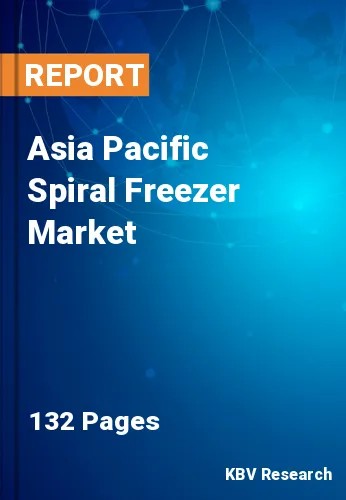The Asia Pacific Spiral Freezer Market would witness market growth of 4.9% CAGR during the forecast period (2023-2030).In the year 2021, the Asia Pacific market's volume surged to 33,900.9 units, showcasing a growth of 3.2% (2019-2022).
Spiral freezers are used in the meat processing sector to preserve frozen and fresh meat products. They are effective equipment that may be found anywhere, including small butcher shops, food carts, and eateries, and even large companies like Walmart and Costco in their stores and warehouses. Most often, the seafood and fish industries use spiral freezers. They are employed in food processing to fast freeze goods at -20°C or lower. The product to be treated immediately freezes when the cold air is released into a chamber with it. This technology is very helpful for high-value fresh foods like seafood and fish products, where maintaining quality is crucial for long-term storage stability complying with the harvest.
Many items can be frozen using the highly efficient spiral freezing technique in a small area. It comes in single spiral freezer and double spiral freezer varieties. For example, it is frequently used for cooling bread, frozen fish, pastries, meat, poultry, and ice cream. It usually utilizes mechanical and cryogenic cooling techniques. Additionally, freezing is a rapid way to preserve food. The water freezes into crystals when the temperature falls below a certain level. Crystal growth is prevented by rapid freezing. Due to the vast temperature variations and extremely high mechanical stresses involved in these systems' functioning, their components are incredibly robust. The food is moved mechanically through various freezing processes in spiral freezers.
Korea has an established food processing sector that produces a wide range of processed foods, drinks, and additives. More than 31,300 food processing businesses with sales of 79.1 trillion KRW, or roughly $69.1 billion, existed in Korea as of 2021. Korean food manufacturing businesses are primarily dependent on imported raw materials and ingredients. In 2018, Korea imported $13.3 billion worth of basic and intermediate agricultural goods. Additionally, between FY 2018 and FY 2023, the milk processing industry in India is predicted to develop at a compound annual growth rate (CAGR) of 14.8%, with a target revenue of INR 2,458.743 Bn ($32.57 Bn). It is expected that the regional market will expand in parallel with the region’s ongoing growth in the food processing and food service industries.
The China market dominated the Asia Pacific Spiral Freezer Market by Country in 2022, and would continue to be a dominant market till 2030; thereby, achieving a market value of $583.9 million by 2030. The Japan market is registering a CAGR of 4.3% during (2023 - 2030). Additionally, The India market would display a CAGR of 5.6% during (2023 - 2030).
Based on Application, the market is segmented into Meat Processing, Bakery, Seafood and Others. Based on Capacity, the market is segmented into Small Capacity, Medium Capacity and Large Capacity. Based on Business, the market is segmented into Aftermarket and OEM. Based on countries, the market is segmented into China, Japan, India, South Korea, Singapore, Malaysia, and Rest of Asia Pacific.
Free Valuable Insights: The Worldwide Spiral Freezer Market is Projected to reach USD 5.8 Billion by 2030, at a CAGR of 4.8%
The market research report covers the analysis of key stakeholders of the market. Key companies profiled in the report include Advanced Equipment, Inc., FPS Food Process Solutions Corp., Linde PLC, John Bean Technologies Corporation, Air Liquide S.A., Mayekawa Mfg. Co., Ltd., Van Abeelen B.V., GEA Group AG, DSI Dantech A/S, Scanico A/S (Middleby Corp).
By Application (Volume, Units, USD Million, 2019-2030)
By Capacity (Volume, Units, USD Million, 2019-2030)
By Business (Volume, Units, USD Million, 2019-2030)
By Country (Volume, Units, USD Million, 2019-2030)
Our team of dedicated experts can provide you with attractive expansion opportunities for your business.

